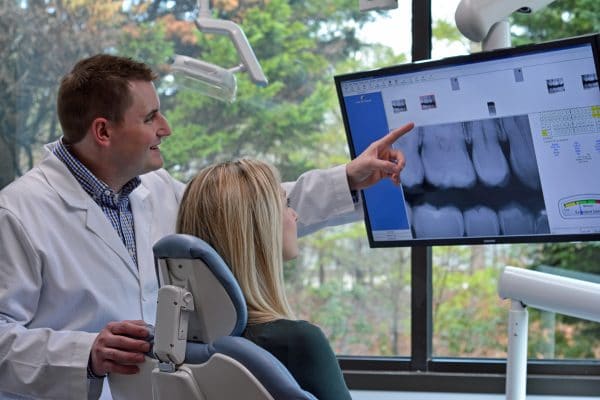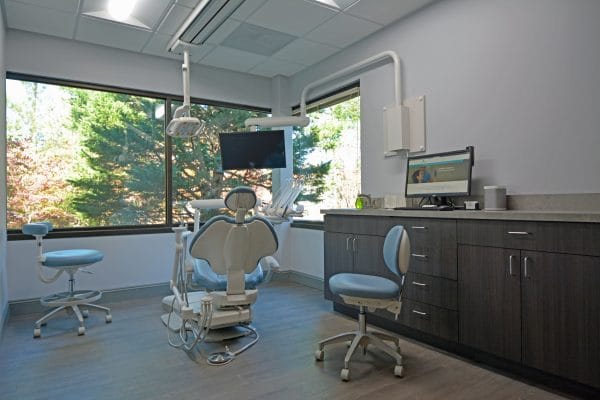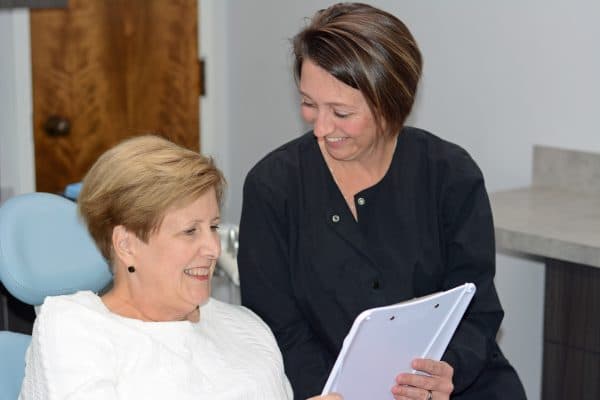Oral Surgery Chapel Hill
fall in love with your smile
Oral Surgery for Complete Oral Health
Oral surgery is a term used to describe a wide range of oral surgical procedures, ranging from procedures that are minor to procedures that are more intensive and complicated. Common oral surgical procedures include corrective jaw surgery, taking a biopsy to analyze for oral cancer, dental implants, and much more.
One of the biggest reasons people avoid going to the dentist is because they are concerned that the experience will be painful or comfortable. In fact, every year, millions of people avoid going to the dentist because they have a negative association or anxiety at the thought of having dental work performed. Whether this is due to a bad experience in childhood or a general aversion to pain, this all too common occurrence is one of the many reasons sedation dentistry can be so beneficial, especially for patients who may benefit from having an oral surgical procedure, but are hesitant to schedule one for the aforementioned reasons.
Sedation dentistry refers to any type of sedation that can be administered to a patient during a procedure. There are a range of sedation types and different levels of sedation. At Cornerstone Family Dentistry, we provide two types of sedation options for our patients: nitrous oxide (commonly referred to as laughing gas) and oral sedation.
Oral surgery can be a wonderful option for patients who are looking for a long-term solution for improving their oral health and preventing additional issues from developing in the future. If you would like to learn more about oral surgery offerings, please read below, or contact our staff who will be happy to answer any of your questions and/or set up a consultation
Common Oral Surgical Procedures
At Cornerstone Family Dentistry, we offer a range of oral surgical procedures designed to meet your unique needs, including but not limited to the following. Please note: our clinic does perform additional oral surgical procedures. If you have any questions about what type of oral surgical procedures we offer, please contact our office today!
Dental Bone Graft
Dental bone grafting is often suggested for individuals who are missing teeth and have experienced significant deterioration of the jawbone. The procedure attempts to facilitate growth of bone tissue in the affected area by placing a graft that is either made of bone (human or animal) or synthetic material. When successful, the bone graft will restore the jawbone and create a structural integrity necessary for placing a dental implant. A bone graft is most typically performed for patients who would like to have a dental implant placed. Dental implants are a common procedure that is performed for individuals who have a missing tooth or teeth, either due to severe decay, or an accident having knocked the tooth out
Root canals
Root canal therapy is often suggested for individuals who have developed an infected pulp. The pulp can become infected if a serious cavity has developed or due to trauma and/or a crack in the tooth. If the pulp is damaged, bacteria multiplies in the pulp chamber, which can result in an infection that can cause an abscess to develop. This infection can also cause swelling in the head, neck, and face. If it is determined that root canal therapy is necessary, the injured pulp will be removed. Once this pulp has been removed, the root canal system will be disinfected using sodium hypochlorite or water.
Dental Implants
The dental implant process will begin with the extraction of a decayed or damaged tooth (if necessary) followed by an x-ray to determine if there is sufficient jawbone to properly hold a dental implant. If there is insufficient jawbone, a dental bone graft may be required. If it is determined that you are a viable candidate, a titanium rod will be installed into your jawbone. After this has healed, the replacement tooth or bridge will be placed on this post and adhered using dental cement or a screw.
Postoperative Care
The type of post-operative care necessary will ultimately depend on what type of surgical procedure you have performed. Regardless of what the procedure was, it is important to follow the post-operative directions provided to you following your procedure to ensure that your healing is as fast and effective as possible.
For more invasive procedures, it is important to be mindful to not touch the area where the surgery was performed. Additionally, when you do brush your teeth or rinse your mouth, be sure you do so gently. If you are prescribed pain medication and/or antibiotics, it is important that you follow the prescription instructions.
Provided you follow your postoperative instructions and continue to practice good oral self-care habits, including brushing and flossing your teeth twice daily and scheduling regular dental checkups, you should enjoy a healthy and expedient recovery. More importantly, following these instructions and maintaining good oral hygiene will likely reduce or eliminate the need for additional procedures of this type in the future.





High-Quality Dental Care
At Cornerstone Family Dentistry in Chapel Hill, all our services are performed with the patient in mind. We want you to feel comfortable in the dental chair, confident in our work, and most importantly, we want you to fall in love with your smile again. If you would like to schedule an appointment or if you have any questions about cosmetic procedures that we offer, please contact us at (919) 595-1010.
